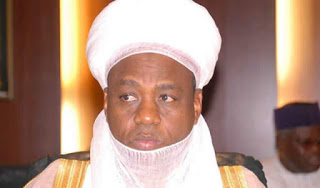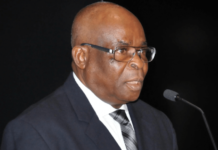As established in our last edition, titled “Ramadan 2018: The Essentials”, the Nigerian Muslim community joined the rest of the world to commence the Ramadan fast yesterday, Thursday, May 17. Surprisingly, for the first time in the history of Nigerian moon sighting, the Sultan of Sokoto, His Eminence, Alhaji Abubakar Sa’ad III officially announced the sighting of the crescent for the commencement of Ramadan 2018 on Twitter, the micro-blogging site, via the Nigerian Moon Sighting Committee (NMSC) handle @moonsightingng.

As a result of this impressive innovation, many Nigerian Muslim youths did not wait for the Sultanate Council’s traditional announcement of the start of Ramadan via the NTA Network News, which usually comes late – when the moon would have been sighted via naked eyes by Nigerians.
This year, however, the story was different. The Sultan was on Twitter, though with only about 3,161 viewers at the end of the 6 minute, 12 second presentation, made in Hausa and English. However, those who could not access Twitter benefitted from several broadcasts on other social media platforms such as Facebook, WhatsApp and blogs featuring the Sultan’s announcement of the sighting of the new crescent and the beginning of Ramadan.
For others, who I regarded as the “old generation of Muslims”, they relied on the NTA Network News where the Sultan announced the sighting of the moon in some parts of the country, including Demoroji in Isa District, Sokoto; Bonny in Port Harcourt, Rivers State; Gumel in Gombe State; Buji, Maiduguri in Borno State; Zamfara State; Bauchi State; Damaturu in Yobe State; Minna in Niger State and Dutse in Jigawa State.
This is a good development. It shows the dynamism of Islam as a religion that embraces innovation – in terms of modern technology or instrumentation that are compatible with the Deen (Islam). Thus, the Sultanate Council as well as the entire #TeamNSCIA must be commended for this achievement, though long overdue, especially now that the world has become a global village.
Wednesday’s announcement via Twitter was an indication that the Sultan is a listening leader who wants nothing but the unity of Nigerian Muslims. It also shows that the Sultanate Council has read our previous articles where we raised concerns about the needless and unnecessary controversies surrounding the commencement and termination of the Ramadan fast in Nigeria.
In my article, “Ramadan: Between Moon Sighting Controversies and Youth Zealousness”, published in the wake of the 2017 Ramadan fast, the need for the leadership to initiate effective and efficient communication with Nigerian Muslims via the new media was established. JazakumuLlahu Khayran, Your Eminence, for listening to our call and taking advantage of modern technology. Of course, this can always get better, as there is also the need for the Sultanate Council to use Facebook as a complement to Twitter, because based on our findings, Nigerian Muslims are more active on Facebook than Twitter.
In his reaction, a prominent South-western member of the National Moon Sighting Committee, Sheikh AbdurRahman Ahmad said the Twitter announcement idea was an opportunity to reach out to a wider audience, mostly the young generation who constitute the youths of the Ummah, within the shortest possible time, adding that, “even if most people have power outage in their localities, they can still follow us on @moonsightingng for live updates on the Ramadan 2018 announcement.”
Sheikh Ahmad, who is the National Missioner of Ansar-Ud-Deen Society of Nigeria, said: “If you observed, you’ll notice that the announcement on Wednesday was faster than it used to be. It came about 8:15pm or thereabouts. Before now however, Nigerian Muslims would have to wait till sometimes around 10 to 11pm, even more, before the announcement could be made via the traditional radio and television.”
Even with the improvements, the announcement could have come earlier than the 8:15pm (Nigerian time) it was made, a view shared by many Nigerian Muslims. For instance, the Amir of The Companion, Lagos District, Ustadh Nojeem Jimoh said the announcement “often comes unnecessarily too late”, as reflected in his Facebook post of yesterday, Thursday, May 17.
According to him, “We knew directly from members of the committee that the moon had been sighted in at least two cities. This was before we observed our Ishah. Although the announcement yesterday was made at a relatively early time of around 8:45 to 9:00pm, yet the confirmation of sighting of the moon by no less than appointed members of the committee had been known so much sooner than this time, and I am of the view that even yesterday’s (Wednesday) announcement could have come sooner.”
Sheikh AbduRahman Ahmad however believes times are changing. “First, there is now a National Moon Sighting Committee, with representatives from all parts of the country. Traditional and religious leaders are now members of the committee. They are responsible for advising the Sultan on the sighting of the crescent.
“Basically, the process takes a lot of time. Notwithstanding, there has been a lot of improvement in the area of moon sighting, collation and reporting, and of course, we must give it to the Sultan, because he is a forward looking, down to earth, and very progressive leader. It is the combination of all these that produced what you witnessed for the first time during the announcement.”
Talking about the technical challenge, Sheikh Ahmad said it was mostly from the service provider, not from the Sultan or the NMSC. “It is what technology affords us at any point in time that we can take advantage of. That is why there was a temporary break in transmission, which was immediately fixed. It is our hope however that in the future, some of these technical and other challenges will be surmounted. It is a thing of joy that it is being embraced by the generality of Muslims”, he said.
Rasheed Abubakar is a journalist and the author of “Muslims and the Threats of the Media”. Email: rawshield123@gmail.com | Twitter @rawshield123











